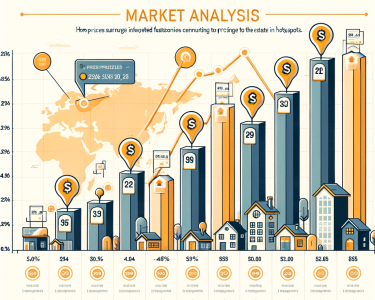Welcome to the future of living and working! As we enter 2023, flexibility has become a top priority for many individuals when it comes to their living arrangements and careers. With remote work becoming increasingly popular, more and more people are choosing to ditch traditional office spaces in favor of traveling the world or working from the comfort of their own homes. But what does this mean for real estate? In this blog post, we’ll explore how these changes in lifestyle are shaping the future of real estate, both for homeowners and investors alike. So strap in and get ready to envision an exciting new chapter in real estate history!
The rise of flexible living arrangements
In recent years, there has been a rise in the number of people who are choosing to live in flexible arrangements, such as co-living spaces and remote work hubs. This is largely due to the increasing affordability and availability of these options, as well as the flexibility they offer in terms of lifestyle choices.
Co-living spaces are communal living arrangements that offer residents their own private bedroom and bathroom, but share common areas such as kitchens, living rooms, and laundries. These types of arrangements are becoming increasingly popular among young professionals and digital nomads who crave community and collaboration, but also value their independence.
Remote work hubs are coworking spaces that provide members with a dedicated workspace away from home. These hubs often offer amenities such as high-speed internet, meeting rooms, and event space. They provide an ideal environment for freelancers, remote workers, and entrepreneurs who want to stay connected to a professional community without the commute into a city center.
The rise of flexible living arrangements is having a profound impact on the real estate market. More and more people are choosing to live in smaller units or outside of traditional city centers in order to take advantage of these new options. This is leading to an increase in demand for smaller homes, apartments, and co-living spaces. It is also putting pressure on traditional office buildings as more companies adopt remote work policies.
What this means for real estate
There are a few different trends that are currently affecting the real estate market. The first is the trend of people wanting to live in smaller spaces. This is partly due to the fact that many people are now working remotely, and so they don’t need as much space as they used to. The second trend is that people are looking for more flexible living arrangements. This means that they want to be able to rent out part of their home, or they want to be able to live in an RV or a van. This is because people are now working remotely, and so they don’t need to live in one place all the time. The third trend is that people are looking for more options when it comes to where they live. This means that they want to be able to live in different parts of the country, or even in different parts of the world. This is because people are now working remotely, and so they don’t need to live in one place all the time.
The benefits of remote work
In recent years, there has been a growing trend of employees working remotely. A remote worker is defined as someone who does not have to be in a specific location to do their job. This type of work arrangement is becoming increasingly popular for a variety of reasons.
The first benefit of remote work is that it offers employees more flexibility in their schedules. With a traditional 9-5 job, employees are often required to be at their desk during set hours. However, with a remote work arrangement, employees can often create their own schedule that works best for them. This can be especially beneficial for those with children or other caregiving responsibilities.
Another benefit of remote work is that it can save employees money on things like commuting costs and child care. When you don’t have to commute to an office every day, you can save money on gas, car maintenance, and public transportation costs. And if you’re able to reduce or eliminate your child care expenses, that can also add up to significant savings over time.
Remote work also provides employees with the opportunity to live and work in different locations. If you’re someone who enjoys traveling or exploring new places, this can be a great way to combine your work and personal life in a way that suits your lifestyle best.
Finally, many people find that they are more productive when they work from home. Without the distractions of a busy office environment, you may find that you’re able to
The challenges of remote work
The rise of flexible living arrangements and remote work has been a boon for many businesses and employees. However, there are some challenges that come with these new ways of working.
One challenge is the lack of face-to-face interaction. Working remotely can be isolating and it can be difficult to build relationships with co-workers when you’re not in the same office. Additionally, remote workers may find it more difficult to stay focused and motivated without the structure of an office environment.
Another challenge is the need for self-discipline. When you’re working from home, there are more distractions and it can be tempting to take breaks or work less than you would if you were in an office. This can lead to decreased productivity and may make it harder to meet deadlines.
Finally, there’s the issue of security. Working remotely means accessing company data and systems from outside the office, which can pose a security risk if proper precautions aren’t taken. Additionally, companies may need to invest in new security software and hardware to protect their remote workers.
How to make the most of flexible living arrangements and remote work
There are plenty of reasons to consider a more flexible living arrangement or working remotely, and many people are doing just that. But what does it mean for real estate?
For starters, it’s important to understand that not everyone is looking for the same thing when they consider a more flexible lifestyle. Some people want the freedom to travel and work from anywhere, while others simply want to be able to make their own schedule. And there are plenty of people in between those two extremes.
But there are some commonalities among those who are interested in flexible living arrangements and remote work. They tend to value experiences over things, they’re often digital nomads or freelancers, and they might be interested in co-living or micro-apartments.
Of course, all of this has an impact on the real estate market. For one thing, there’s an increased demand for short-term rentals and furnished apartments. And as more people work remotely, there’s less need for office space. We’re also seeing a shift away from traditional suburban neighborhoods and towards urban areas with more amenities.
If you’re considering a more flexible lifestyle, it’s important to do your research and figure out what type of arrangement would work best for you. There are a lot of options out there, and the right one for you will depend on your specific needs and situation. But once you find the right fit, you can
Conclusion
The transition to flexible living arrangements and remote work has marked a new era for the real estate industry. In 2023, we can expect to see more focus on creating spaces that are designed for comfort, collaboration and productivity. We may also start to see more investment in areas of the world that have previously been overlooked due to their lack of access to traditional office locations. How this trend will ultimately affect real estate is yet to be seen, but one thing is certain: it’s sure to bring about a wave of change in the coming years.




